Kilim Geoforest Park, one of the three main portions of
Langkawi's UNESCO-listed geopark, has some of the island's most beautiful and
geologically significant landscapes, including Setul rock formations that date
back 490 million years.
The park is centered on the mangrove-lined Kilim River,
which is home to a broad range of lifeforms, including ancient and endangered
Cycad trees as well as beautiful kingfishers and hornbills. The terrain changes
abruptly at the river's mouth, from muddy mangroves to gorgeous beaches and
towering limestone islands.
Kilim Geoforest Park, which spans 100 square kilometers, is
best explored by boat. Tourists can travel from two sites to 14 different
sights, including caves, islands, beaches, and a floating fish farm.
Gua Kelawar, or "bat cave," is home to 3,000 bats
and shell clusters that reveal water levels from 5,000 years ago; Tanjung Rhu
beach, with its white sands and calm waters; Gua Cherita, or "Cave of
Legends," where a Chinese princess is said to have been held captive by
the Phoenix in a local legend; the floating fish farm for a tour or seafood
lunch; and wild eagle spotting from the boat.
Location: View On The Map
Price: Two - hour tour: RM350 per boat ($79.83),
three - hour tour: RM450 per boat ($102.63), four - hour tour: RM500 per
boat ($114.04)
Time Spent: 2 “ 4 hours
Hours of the day: 9am to 5pm 7 days a week
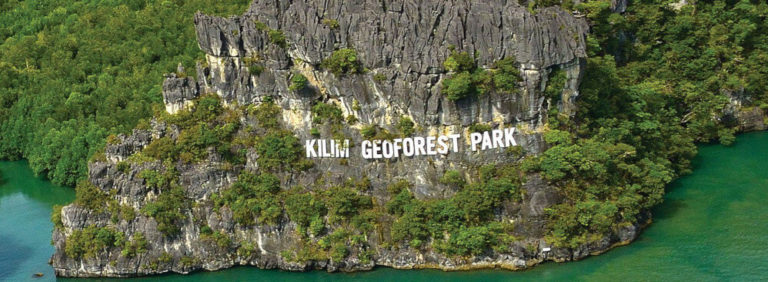
Who Will Enjoy Kilim Karst Geoforest Park in Langkawi, Malaysia?
Nature Lovers
In both coastal and mangrove areas, take in the range of natural vistas and various flora and wildlife. The brown kingfisher, Oriental pied hornbill, Brahminy kite, and white-bellied eagle are among the 22 species of butterflies, as well as monkeys and birds. Try to distinguish between Bakau Kurap and Bakau Minyak, two major mangrove species.
Photography Whiz
Bring an extra memory card because there is so much natural beauty to see. Vertical cliffs, lovely beaches, uncommon plant species, fascinating rock formations, and, if you're lucky, Langkawi's famed sea eagle are just some of the sights to behold. Drone pilots will love the islands.
Culture Buff
As you stroll through limestone tunnels where 500-million-year-old fossils were uncovered, learn about the geological significance of Langkawi's UNESCO World Geopark status. At Gua Cerita, hear stories from local folklore, and visit the floating fish farm to learn about Langkawi's fishing history.
Fun Expert
Spend the day with your family and friends in nature. Play in the cool waters at Tanjung Rhu Beach, get up close and personal with a stingray at the floating fish farm, and watch eagles swoop down to collect fish tossed from the boat.
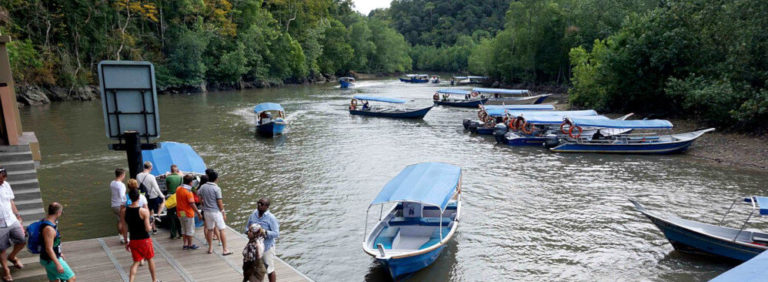
Insider Tips About Kilim Karst Geoforest Park Malaysia
Before taking the boat tour, stop by the Geopark Discovery
Centre, which is close to the carpark. This will help you better comprehend the
significance of the park's mangrove vegetation and rock formations.
The main Kilim Geoforest Park entrance as well as Tanjung
Rhu Beach provide mangrove boat cruises.
Private boats can be reserved in advance online or at the
ticket counter. A river cruise is included, as well as four key stops: the bat
cave, crocodile cave, floating fish farm, and eagle gazing, as well as a
variety of other stops depending on the length of your tour. Two-hour trips
have four stops, three-hour tours have five, and four-hour tours have six.
Join-in excursions are less expensive, but departure times
are based on the quantity of passengers. These tours are available upon request
at the ticket counter.
Some stops charge an additional cost to enter. Adults pay
RM2 (USD$0.46) and children from 4 to 12 pay RM1 (USD$0.23) to visit Gua Kelawar
(bat cave).
Boats can accommodate up to 10 adults and 2 children, with
all passengers wearing life jackets.
Speak with your boat driver about stopping for lunch at the
floating fish farm's seafood restaurant.
If you remove water bottles, plastic bags, or food from the
boat, the monkeys will attempt to steal them and get hostile.
Before leaving the park, use the restrooms at the jetty, as
there are none within the park.
Look for shapes in unusual rock formations such as
"Gorilla Peak," a limestone peak fashioned like King Kong.
The Kilim River may be recognized as the setting for the 1999 film Anna and the King.
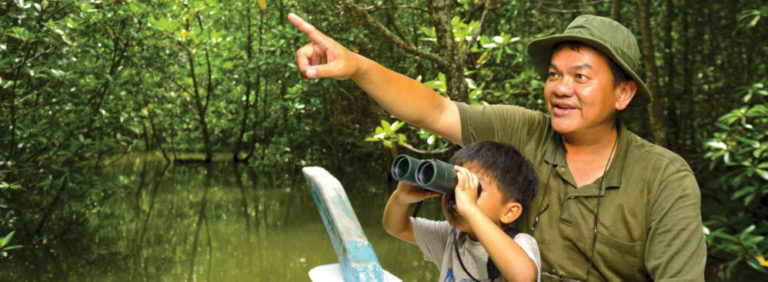
What To Bring Along
Do:
Rubber shoes with an enclosed toe that can get wet while
still protecting your foot from jagged pebbles.
Protect your stuff with a waterproof bag.
Water bottle that can be reused. To keep monkeys at bay,
avoid using plastic.
Entry fees are paid in cash.
To photograph animals, use a camera with a zoom lens.
Repellent for mosquitos. Before entering caves, reapply.
Don't:
Soft drink or food that is visible. Keep these hidden since
monkeys may assault the boat and steal them.
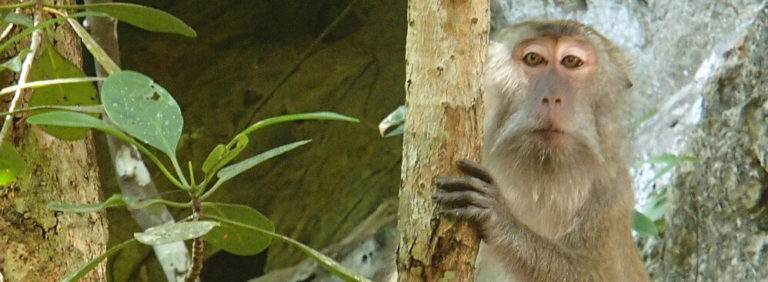
Food & Drink
Food Court - Near the parking lot, a
local-style food court with various cafes serving seafood, laksa, and nasi
lemak. Burgers and fries are also available at some stalls.
Backstory
Kilim Karst Geoforest Park is one of three
major geoparks recognized by UNESCO as part of Langkawi's Global Geopark
designation. Machinchang Cambrian Geoforest Park and Dayang Bunting Marble
Geoforest Park are the others. Kilim is the only area in Langkawi where mangrove
and coastal karst habitats coexist.
Setul formation, produced 490-370 million years ago in Kilim Geoforest Park, is the region's oldest carbonate rock. The existence of fossils such as trilobites, predecessors of contemporary insects; gastropods, snails and slugs; and brachiopods, lamp shells, can be used to assess the age of portions within the park. The age of these fossils ranges from 505 to 286 million years.
Etiquette
Do: Always wear a life jacket when on the
boat.
In the caves, keep silent.
Respect the guides and residents.
In dark caverns, use your iPhone as a flashlight, but don't
point it at the bats.
Don't: Feeding monkeys or other animals is prohibited.
The caves are filled with smoke.
Monkeys may try to steal plastic bottles or bags, so make them visible inside or outside the boat.
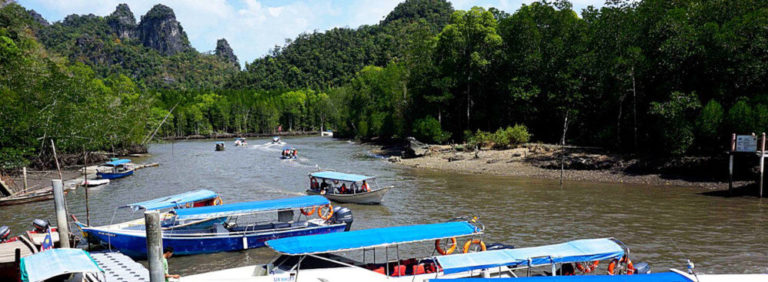
Best Parts:
Land forms have geological and historical significance.
Coastal and mangrove environments provide natural charm.
Sea eagles and Brahminy kites can be seen.
Caves, beaches, and mangrove forests are among the many things to visit.
Could Be Better:
Feeding wild eagles has ethical implications.
Pollution in the water and on some islands is particularly
bad during the rainy season.


